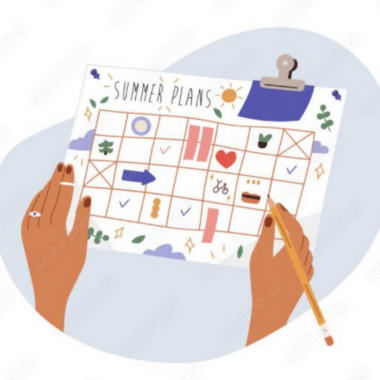First Weeks of College: Questions you may be asking
Introduction
There’s no such thing as a stupid question when it comes to understanding the basics of how to maneuver college life. This blog post will hopefully address your main questions and concerns when it comes to how college differs from high school.
How to: Social Life
Even in my third year of college, COVID has made things really hard and "campus life" is totally different than what it used to be. Here are some helpful tips you may not have considered without any prior experience:
1. Join GroupMe and/or make other group chats
Your dorm building/floor will likely have a GroupMe created by your RA (take advantage of it!). Some of my closest friends were made by my roommate and I sending messages in GroupMe. The first two weeks of class we offered to play Wii and card games in the study lounges and although it can be awkward at first, I made 5 of my closest friends all on the same floor through a simple GroupMe message (don’t knock it till you try it). Many of your classes will also have group chats available where you can easily offer study sessions or even invite anyone who is interested out to lunch (you’d be surprised how many people agree to all meet up at Chipotle after class).
2. Look forward to any orientations or campus activities (like Sparticipation)
Try to dip your toes into as many organizations as possible because the networking will give you more experience and contacts in general. Going to early campus events and a couple club meetings can give you a better idea of what you’re interested in and what type of personalities you get along with depending on the environment.
*Feel free to ask me and the other peer advisors what our favorite events/clubs are to get a better idea.
3. Study in public spaces
Study in public! I personally love the library and the open desk area in Wells Hall (plus there’s a Starbucks in there which helps). As tempting as it is, don’t stay cooped up in your dorm all the time. If you’re in public, there’s a 100% chance that you’re more likely to interact with people. Try to also meet your suitemates or other people on your floor (my roommate and I knocked on everyone’s door the first two weeks to introduce ourselves and now we’re living with one of the girls this year). Overall, even if you can’t will yourself to talk to strangers, you can’t meet new people if you don’t get out on campus (so do yourself a favor and at least attempt to by sitting in a lounge or getting coffee).
How to: Academics
Learning is the main reason we’re all in school (hopefully – it could vary day to day). Here are some tips to ease into college curriculum:
1. Come to class prepared
I cannot stress this enough: WRITE. DOWN. DUE DATES. Use your outlook calendar or buy a cheap and easy physical planner (my preference) and write down the due dates of all your assignments for all your classes as soon as you get the syllabus. This will save you in the future (as well as the class GroupMe – don’t flood it with questions found in the syllabus) because it will help you become better prepared for the semester and let you plan for when you need to set aside time to study and get your work done. During the semester, if you realize you missed a due date for an assignment, all hope is not lost. It is important to still try to complete the assignment as soon as possible to get as much credit for it as you can, because an 80 is better than a 0 (just make sure the syllabus says you can still turn it in after the due date).
2. Form a relationship with your professor
Do your best to communicate with your professors and try to build a relationship with them. Later down the line if you need help, they'll be more inclined to be gracious if there's already a relationship. Don’t be afraid to ask questions or let them know you need help. I was too prideful my first year to ask for help but I learned that sometimes office hours are vital in keeping your grades strong. Also important: MEET WITH YOUR ADVISORS!!! Schedule regular appointments with an advisor to make sure you're on track.
3. Schedule your classes to suit your needs
If you're not a morning person (I know for a fact I’m not), do NOT schedule 8 a.m. classes because as much as you think you can turn yourself around and be punctual, 8 a.m. classes may become tortuous for someone not acclimated to getting up early (kudos to those of you that love getting up nice and early). RateMyProfessors.com is an extremely helpful website in picking your classes because you can check to see what the professor is like before you enroll in the class, however, take everything with a grain of salt and don’t be completely swayed to not take a course just because of a few outdated reviews. If you're completely virtual, don't attend lectures from your bed. Either sit at your desk, go to the library or somewhere other than your room, and actually focus in class. It can be easy to blow off your lectures, but it is extremely important for you to participate and stay on top of it because it will make your readings and assignments easier when you're already familiar with the material. Remember that even if you don't do well in a class, it's not the end of the world. You just have to learn from it and make sure you do better for the next one. College is a learning experience.
How to: Health
1. Take care of yourself
It may be tempting but try not to pull too many all-nighters (going out or staying in and doing homework). Personally, you may find going to the gym (like IM West) a few times a week to be a good stress reducer. Overall, I’d say to at least be mindful of what you eat (even though it's tempting, don't settle for fast food and junk food all the time from on-campus restaurants and the dining halls). Maybe make a routine of stretching when you wake up and bringing a water bottle to each class. Since we’re on a big campus, consider getting a bike and a sturdy bike lock (I recommend the U-locks over cables because those can get cut easily). Biking makes your commute so much easier and saves you more time to sleep instead of walking to class or going wherever you need to go.
How to: Finances
School costs money. Unfortunately, this means most of us will need to be conscientious about where and how we spend our money. Here are some of my own tips based off personal experience:
1. Apply for FAFSA each year
Filling out FAFSA is not mandatory (colleges don’t require students to fill out FAFSA to either apply or attend), however, if you or your family choose not to fill it out, you will not be able to access any federal financial aid (which depending on your situation may not fair well). It can’t hurt to at least have the option and see what is available – you will still have the option to accept or deny the grants or loans.
2. Look for scholarships
Be on the lookout for scholarships (a simple search online can be a great start). If you qualify, that's free money with your name on it! If scholarships or additional funding turns out to not be enough and you have to take out loans, that's completely normal (but make sure you talk to some trusted family or friends about it and do your research on the type of loans you should get).
3. Be mindful about where your money is going
Don't immediately start spending all your money on eating out and new clothes because you'll need that money for textbooks and supplies for your classes. Between online homework platforms and textbooks, be prepared to drop a few hundred dollars every semester (it adds up quickly). If available, try to purchase the online versions of textbooks because they are typically way cheaper than the physical copies. Used textbooks from the campus bookstore may also be discounted. It’s also important to note that it may be wise to carry some cash on you while on campus as having ten or twenty bucks can save you if you're having problems with your debit/credit card at any given moment.
4. Consider a job
It may be in your best interest to get a job on campus or find somewhere to work nearby. As you’re probably a full-time student, the job should likely be part-time. Having a job while juggling school will be great experience and you can put it on your resume. It also doesn't hurt to have extra money for yourself. Moral of the story is to be smart with your money, maybe attempt a budgeting plan to facilitate good money management habits (a valued life skill).
Conclusion
If you made it to the bottom of this page, I salute you! I sincerely hope you found some useful information based on my personal experience as a MSU student. Some of this information may seem straightforward, but I know I would have appreciated having it all typed out for me as an underclassman. Good luck on your schooling journey.



